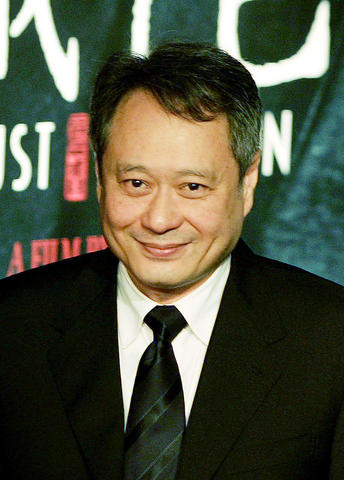Taiwanese director Ang Lee's (李安) erotic spy thriller Lust, Caution (色,戒) is tipped to win top honors at this year's Golden Horse Film Awards (金馬獎), considered the Chinese-language Oscars, critics say.
Lust, Caution leads the race with 11 nods and a special outstanding Taiwanese filmmaker of the year nomination for Lee at the 44th edition of the awards to be handed out in a glittering ceremony in Taipei tomorrow.
The film is competing against an immigrant drama set in Australia, The Home Song Stories (意), Hong Kong police thriller Eye in the Sky (跟蹤), a black comedy set in rural China, Getting Home (落葉歸根), and a satire on Taiwanese politics What on Earth Have I Done Wrong? (情非得已之生存之道) for best film.

PHOTO: AP
"Lust, Caution is apparently the heavyweight in best film and best director categories as its production quality stands out among all competitors," said film critic Liang Liang.
Hong Kongers Yau Nai-hoi (游乃海) of Eye in the Sky and Derek Yee of gangster flick Protege (門徒) will challenge Lee and Chinese director Jiang Wen (姜文) of The Sun Also Rises (太陽照常升起) for the best director gong.
"I think Ang Lee has all the advantages as this is a Taiwanese film festival and Lee is very popular in Taiwan while the film is a hit here," said critic Steven Tu, adding however that Lee faced a strong challenge from Jiang. Lust, Caution won the Golden Lion for best picture at the Venice Film Festival.
Lee, noted for blending elements from the East and West to depict characters struggling to fit into society and live up to family pressure, won the best director Oscar for his ground breaking gay cowboy drama Brokeback Mountain in 2006.
Critic Liang noted that Singaporean films were also making a splash this year with Jack Neo's satire on government bureaucracy Just Follow the Law (我在政府部門的日子) earning three nods and director Royston Tan's comedy 881 also getting a nomination.
Singapore's Gurmit Singh (葛米星) from Just Follow the Law (我在政府部門的日子) is vying for best actor against big-name rivals Tony Leung Chiu-wei (梁朝偉) of Lust, Caution and Aaron Kwok (郭富城) from The Detective (C+偵探) of Hong Kong and veteran Chinese comedian Zhao Benshan (?本山, Getting Home).
Leung and Kwok are both eyeing an unprecedented third best actor gong but critics believe Leung has the edge for his performance as a powerful Japanese collaborator in Lust, Caution, which is set in World War II Shanghai.
"Leung subtly portrays his character's dark sides and his desires for lust and love. I think he gives the role such depth although he has much less screen time than the female lead," Liang said.
Leung's Chinese co-star Tang Wei (湯唯), who plays a resistance spy who seduces and plots to kill him, is up for best actress with critics predicting a tight race with Chinese-American veteran Joan Chen (陳沖) for her performance in The Home Song Stories.
Chen also stars in Lust, Caution as Leung's sophisticated wife and the two women appeared in a number of scenes together.
Critic Liang favors Tang to walk off with the award as Lust, Caution centers on her character and as a novice she delivers an impressive performance in the film, which has earned adult certificates for its explicit sex scenes.
"Joan Chen no doubt is a good actress but I think her role as a nightclub singer and immigrant is too easy for her and the movie itself is somewhat stereotypical," echoed critic Tu.
The Home Song Stories, which earned seven nods, depicts the troubled love life of Chen's character, who moved to Australia from Hong Kong with her two children. It is competing for a best foreign language film Oscar representing Australia next year.
Also vying for best actress crown are China's Li Bingbing (李冰冰) in The Knot (雲水謠) and Taiwan's Rene Liu (劉若英) in Kidnap (綁架).
Critics point out that China replaced Hong Kong to dominate the spotlight this year in major categories, despite the controversial withdrawal of two widely-acclaimed Chinese films, both of which had been nominated for best director.
Tuya's Marriage (圖雅的婚事) and Blind Mountain (盲山) were pulled from competition without any official explanation, while local media blamed political reasons due to lingering tensions between Taiwan and rival China.
Some 36 films will compete for top honors at this year's Golden Horse Film Awards, which are styled on the US Academy Awards but decided by a jury like at the Cannes film festival.
The Golden Horse Awards take place tomorrow night. For full coverage of the results, see Sunday Features, Page 17.

Taiwanese chip-making giant Taiwan Semiconductor Manufacturing Co (TSMC) plans to invest a whopping US$100 billion in the US, after US President Donald Trump threatened to slap tariffs on overseas-made chips. TSMC is the world’s biggest maker of the critical technology that has become the lifeblood of the global economy. This week’s announcement takes the total amount TSMC has pledged to invest in the US to US$165 billion, which the company says is the “largest single foreign direct investment in US history.” It follows Trump’s accusations that Taiwan stole the US chip industry and his threats to impose tariffs of up to 100 percent

On a hillside overlooking Taichung are the remains of a village that never was. Half-formed houses abandoned by investors are slowly succumbing to the elements. Empty, save for the occasional explorer. Taiwan is full of these places. Factories, malls, hospitals, amusement parks, breweries, housing — all facing an unplanned but inevitable obsolescence. Urbex, short for urban exploration, is the practice of exploring and often photographing abandoned and derelict buildings. Many urban explorers choose not to disclose the locations of the sites, as a way of preserving the structures and preventing vandalism or looting. For artist and professor at NTNU and Taipei

March 10 to March 16 Although it failed to become popular, March of the Black Cats (烏貓進行曲) was the first Taiwanese record to have “pop song” printed on the label. Released in March 1929 under Eagle Records, a subsidiary of the Japanese-owned Columbia Records, the Hoklo (commonly known as Taiwanese) lyrics followed the traditional seven characters per verse of Taiwanese opera, but the instrumentation was Western, performed by Eagle’s in-house orchestra. The singer was entertainer Chiu-chan (秋蟾). In fact, a cover of a Xiamen folk song by Chiu-chan released around the same time, Plum Widow Missing Her Husband (雪梅思君), enjoyed more

From insomniacs to party-goers, doting couples, tired paramedics and Johannesburg’s golden youth, The Pantry, a petrol station doubling as a gourmet deli, has become unmissable on the nightlife scene of South Africa’s biggest city. Open 24 hours a day, the establishment which opened three years ago is a haven for revelers looking for a midnight snack to sober up after the bars and nightclubs close at 2am or 5am. “Believe me, we see it all here,” sighs a cashier. Before the curtains open on Johannesburg’s infamous party scene, the evening gets off to a gentle start. On a Friday at around 6pm,